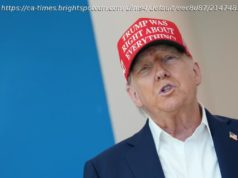In a statement earlier today, President Donald Trump said that military action will not be his first choice when it comes to how to handle North Korea’s ongoing moves to develop its nuclear and…
In a statement earlier today, President Donald Trump said that military action will not be his first choice when it comes to how to handle North Korea’s ongoing moves to develop its nuclear and ballistic missile programs. The statement was made by the President only hours after he spoke by phone with Chinese President Xi Jinping.
“We’ ll see what happens. We’ ll see what happens, ” Trump said when asked if he was still considering military action. “Certainly that’s not a first choice, but we’ ll see what happens.”
The phone call comes shortly after Trump and his administration gave stern warnings to North Korea that further threats would be met with military force, including with a possible nuclear strike. Those warnings came after North Korea conducted its sixth nuclear test on Sunday.
That underground blast was by far North Korea’s most powerful ever. Though it wasn’ t clear that North Korea had indeed set off a hydrogen bomb, as it claimed, the explosion still caused tremors that were reportedly felt in South Korea and China. Experts estimated that the blast was anywhere from four to sixteen times more powerful than any the North had set off before, with far more destructive power than the bombs dropped on the Japanese cities of Hiroshima and Nagasaki during the Second World War.
Immediately after the blast, United States Defense Secretary, James Mattis warned of “a massive military response” to any threat from North Korea to use such a weapon against the U. S. or any of its allies.
The day after the explosion, U. S. Ambassador to the United Nations, Nikki Haley accused North Korean leader Kim Jong Un on Monday of “begging for war” and urged the Security Council to impose the “strongest possible” sanctions. On top of that, Donald Trump was critical of South Korea after their President, Moon Jae In said he wished to work towards peaceful denuclearization as it related to the North.
Moon has been pushing for some kind of engagement with North Korea almost since he was elected President of the South in May, and his office responded to Trump’s tweet with a statement expressing the country’s lack of desire to go to war with North Korea and reaffirming the idea of handling things peacefully.
“South Korea is a country that experienced a fratricidal war. The destruction of war should not be repeated in this land, ” the statement said. “We will not give up and will continue to push for the denuclearization of the Korean Peninsula through peaceful means working together with our allies.”
Trump’s administration appears to have softened its stance on the matter following his conversation with the Chinese President. Trump, who had stated in a telephone call with U. K. Prime Minister, Theresa May just yesterday that now was not the time to focus on talks with North Korea and maintained that all options remained open to defend the United States and its allies against North Korean aggression, spoke with a different tune after conferring over the phone with Xi Jinping.
Following the phone call with Jinping, Trump said that he believed they were on the same page. It is worth noting that Donald Trump has repeatedly turned to China to assist in dealing with North Korea. Clearly, Trump hopes that China, which is North Korea’s neighbor and biggest trading partner, will use its influence to bring about a stop to the regime’s increasingly aggressive nuclear and ballistic missile activity — activity which has only increased since Donald Trump was elected to office.
Beijing, China’s capital city, has said reining in North Korea is not entirely its responsibility, and has expressed doubts that economic sanctions from the United Nations, which it has backed, will resolve the situation. Also, completely cutting off North Korea could lead to its collapse, unleashing a wave of refugees into China’s already overpopulated northeast.
Another reason why Donald Trump has suddenly decided against taking immediate military action is because success is not promised. While the Pentagon has worked up a series of military options for targeted strikes at North Korea’s nuclear and missile sites, Trump has been told by his advisers that there is no assurance that the United States could destroy them all in a lightning strike. Cyber strikes, which President Barack Obama ordered against the North’s missile program, have also been judged ineffective. All of this could influence President Trump to go along with China and South Korea’s idea, which is to handle the Korean Peninsula nuclear issue peacefully and with dialogue.
For what it’s worth, China and Russia have advocated a plan in which the United States and South Korea stop major military drills in exchange for North Korea halting its weapons programs, but, thus far, neither side has been willing to budge.






